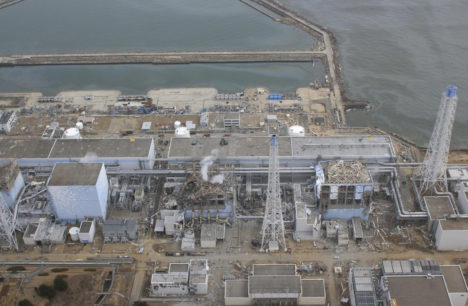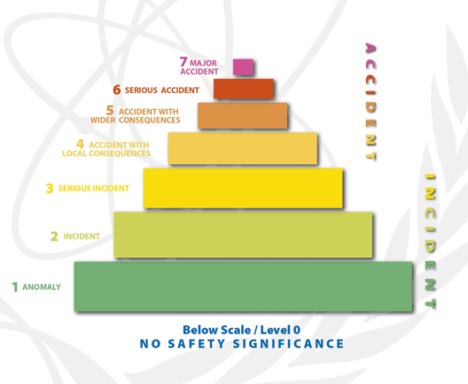Japan is considering increasing the severity of the nuclear disaster in Fukushima to level 7, the same as Chernobyl, amidst ongoing radioactive leakage and the doubling in size of the evacuation zone.
Hourly radioactive leakage from the plant is being estimated to have reached a maximum of 10,000 terabecquerels. The scale of total leakage is not yet known.
For comparison, the total leakage of radioactive iodine from Chernobyl is estimated at 1.8 million terabecquerels (at a rate of 10,000TBq/h, this could be reached in a week), with a further 380 terabecquerels of strontium and plutonium contamination.
Accordingly, the government is considering elevated the International Nuclear and Radiological Event Scale scale of the disaster from 6 to 7, the highest level possible and the level assigned to Chernobyl.
Although recovery efforts at the plant have survived several powerful aftershocks, Tepco have already dumped huge amounts of radioactive coolant into the sea whilst various parts of the core apparently remain open to the atmosphere.
The government is also increasing the size of the 20km evacuation zone around the plant to 30km after new data showed radiation levels increasing towards unhealthy levels, although in fact evacuation orders for areas as far away as 40km have been issued.
The indirect effects of the crisis also continue to mount – the government’s efforts to cover up the extent of radioactive contamination of the region’s agricultural produce is now in danger of causing a national food scare.
Rather than simply ban agricultural produce from the region, in an effort to preserve the reputation of the areas affected the government has increased the allowable radiation in the area’s rice crop by a factor of ten.
Additionally, it has emerged that when regional milk producers had their produce tested for radiation, rather than be tested individually they were allowed to dilute their milk with less radioactive milk from other areas.
As a result of these measures there is now concern that consumers worried (generally unreasonably) about contamination will feel they are unable to trust any food sold in eastern Japan, as apart from home cooking there is no practical way of knowing whether such food includes contaminated ingredients.
Short of an actual nuclear explosion (thankfully regarded as a near impossibility), it is hard to see how matters could be much worse.
Update: The level has since been officially raised to 7, with Kan saying he has “no problem” with the decision.









this will take years or cleaning this up.
good luck japan
yeah
-La Nyah
we’re gonna fuckin die!!!
its not as bad as you think chill out!
-La Nyah
ARE YOU FUCKING KIDDING????
just because it may be level 7 DOESNT mean its like cherynobyl AT ALL as a matter of fact radiation from fukidamashia is less the 10 percent of chernobyl
its a serious accident but its nothing like Chernobyl
-La Nyah
Its pretty sad. Wonder how many hundred/thousands of years before anyone will live at that place again?